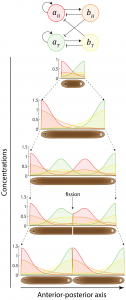Multicellular organisms can be composed of trillions of cells, some of which are highly differentiated and perform specialized functions, while others are progenitor cells capable of replacing matured and functional cells. This diversity gives rise to many interesting and important questions. For example, how does a single-cell embryo give rise to this diversity of cells? When and how do progenitor cells replace dying or killed differentiated cells? Why and how do some cells become malignant and how do other cells respond to this change? How do cells become specialized and mediate their function? Students participating in the area of specialization CDN will be involved in a research program addressing these important questions and receive advanced training in one or more of the fields of cell biology, developmental biology, immunology, cancer biology, plant biology, and/or neurobiology. As part of their graduate program and upon consultation with their thesis advisor and committee, students will choose three or more courses from the following list.

Courses of interest
- Advanced Topics in Cell Biology (BIOL 620)
- Immunology (BIOL 625)
- Approaches to Molecular Biology (BIOL 626)
- Introduction to Developmental Biology (BIOL 642)
- Advanced Topics in Developmental Biology (BIOL 643)
- Development and Cancer (BIOL 644)
- Signal Transduction (BIOL 645)
- Neurobiology (BIOL 651)
- Vision Science (BIOL 654)
- Plant Molecular Biology (BIOL 656)
- Genome Science (BIOL 686)
- Chemical Communication and Brain Disorders (BIOL 690)
- Courses from other AOS
Faculty participating in CDN
Charles Bieberich: Cancer biology
Rachel Brewster: Brain development and metabolism
Thomas Cronin: Visual ecology
David Eisenmann: Wnt signaling and cell fate specification
Jeffrey Gardner: Bioenergy and bioremediation
Erin Green: Epigenetic regulation of the genome
Tara LeGates: Neural circuits and behavior
Weihong Lin: Neurobiology of chemosensory systems
Daniel Lobo: Systems biology of development and cancer
Bernard Lohr: Auditory ecology
Hua Lu: Mechanisms of plant immunity
Stephen Miller: Development of green algae
Achuth Padmanabhan: Cancer biology
Phyllis Robinson: Signal transduction in the visual system
Michelle Starz-Gaiano: Regulation of cell motility
Laurie Sutton: Neurobiology of orphan receptors
Fernando Vonhoff: Neurodevelopment and degeneration